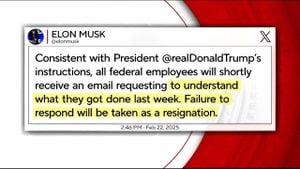Friedrich Merz from the Christian Democratic Union (CDU) is set to become the new Chancellor of Germany, marking a major political shift following the federal elections held on February 23, 2025. This momentous event saw the CDU securing approximately 29% of the vote, positioning them again at the forefront of German politics.
This election has been described as historic, not just for the CDU's victory but also for the unprecedented performance of the far-right Alternative for Germany (AfD), which doubled its representation, achieving around 19.5% of the vote—an all-time high for the party since its inception.
The incumbent Chancellor Olaf Scholz, leading the Social Democrats (SPD), faced severe backlash with his party dropping to around 16%—a significant decline from its previous performance. Scholz acknowledged the SPD's defeat with visible disappointment, stating, “We have lost the elections, there’s nothing more to discuss.” His party’s struggles are perceived as indicative of broader discontent among voters.
The Green Party, which had previously enjoyed substantial support, saw its share sink to approximately 12.1%, reflecting criticism over its handling of issues such as immigration and environmental policy. Meanwhile, The Left party (Die Linke) saw its fortunes improve, climbing to about 8.5% as it regained voter trust.
Record voter turnout reached 84%, the highest since the fall of the Berlin Wall, demonstrating a renewed interest among citizens to engage with the electoral process.
Friedrich Merz, 69, who has long been seen as the CDU’s conservative stalwart and rival to former Chancellor Angela Merkel, has navigated this recent election with a campaign focused heavily on immigration and economic issues. With his party now at the helm, he expressed determination to lead Germany effectively, stating, “We, the CDU and CSU, have won these elections.”
Merz’s political career has been marked by ups and downs; after extensive experience within the CDU, he spent years outside of political office, working in finance. His return to politics has been characterized by advocating for stricter immigration policies and economic reforms advocating tax cuts and reduced public spending.
On the topic of immigration, Merz has been controversial, emphasizing the need for tougher border controls and expulsion policies, which has garnered both support and criticism. Critics claim these measures could contravene EU regulations concerning asylum. Following the elections, he reaffirmed his stance, stating, “We will always be ready to be part of any government willing to implement the people's will.”
The election results have prompted reactions from various political leaders. Alice Weidel of the AfD heralded the outcomes, emphasizing the party’s substantial electoral growth and readiness for governance: “We have effectively doubled our votes, something everyone predicted would not happen,” she exclaimed, reflecting the enthusiasm within her party.
Conversely, Olaf Scholz is expected to step aside as leader of the SPD, facing calls for significant reforms within the party. His acknowledgment of the 'bitter defeat' has raised discussions on the need for rejuvenation of their strategies and leadership.
Political analysts predict challenging negotiations as parties seek to form coalitions to establish governance going forward. The CDU, with the possibility of collaborating with either the SPD or the Greens, faces hurdles due to its prior pledges to avoid right-wing coalitions, particularly with the AfD. Some speculate Merz might pursue alliances with smaller parties like the Free Democrats (FDP) and the newly formed BSW, potentially leading to complex coalition dynamics.
Markus Soeder, leader of the CSU, has reiterated the party’s veto against any coalition involving the Greens, emphasizing their decline. “If the FDP manages to secure seats, it would be preferable to work with them and the SPD, who have already committed to renewal,” he noted.
Internationally, leaders like Israeli Prime Minister Benjamin Netanyahu and French President Emmanuel Macron have congratulated Merz on his electoral success, highlighting the importance of partnerships moving forward. Zelensky from Ukraine has also expressed eagerness to collaborate closely with the new German administration.
This election has undoubtedly reshaped the political map of Germany, introducing both challenges and opportunities. The upcoming coalition negotiations will be watched closely, as the nation braces for significant policy shifts under Merz’s leadership.
With the winds of political change sweeping through Berlin, the CDU is positioning itself for potentially transformative governance at a time of rising challenges both domestically and abroad. The path forward may be complicated, but the stakes are undeniably high for the future of German democracy.



